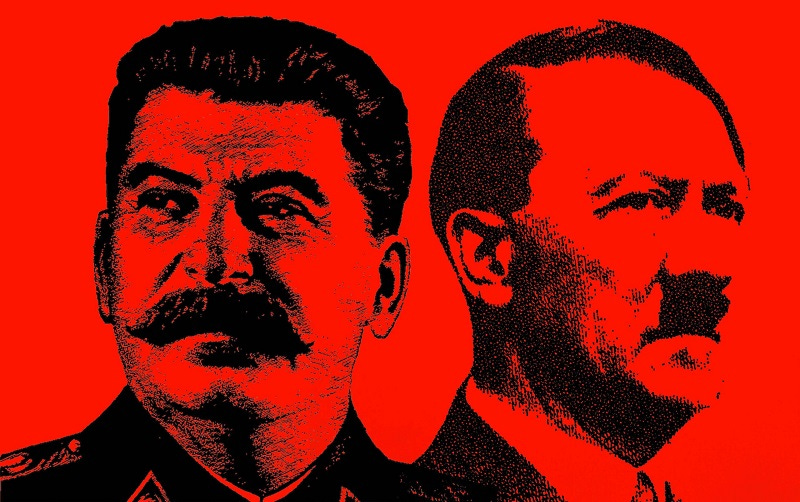“One of the schoolboard’s favourite questions that were randomly put to us at the classes during the Soviet times was: ‘What is the purpose of the Theory of two enemies?’ And depending on the answer we provided, our parents might get arrested that same evening. This apparently innocent question was one of the tactics used by the Soviet control for finding out who could be or could have been involved in the underground Polish government during or after the war. Indeed, under the Soviet domination its members were —unofficially— persecuted by the URSS because among them there was a faction (rather a minority) which had always considered that Stalin was as much of an enemy to fight as Hitler had been. This is the reason why Russia, despite combatting alongside the Allies against the Third Reich during the last months of the war, wanted, once this finished, to also finish with those who had been fighting Hitler in secrecy: because some of them had also fought Stalin. Sure enough, there were internal differences within our government behind the scenes, and about 15% of its members conspired against the Soviet power…”
In her halting English, full of hesitations, struggling with her feeble memory and a lack of concentration that impeded her somewhat, Elzbieta Pleszczyńska, Ela, spoke to me — with her elderly tremulous voice — from her easy chair at the corner of the small appartment in Chłodna (Warsaw), the very same street where, seventy years before, had taken place some of the stories she told me. She uttered her sentences slowly, first shaping them in her mind, eyes closed — as though she had all the time in the world — and then pausing whenever she had to search for a word, which sometimes would take long seconds to come. But she was not in a hurry, neither was I.
It had been by sheer chance that I met her. Well... of course, in a way we always meet people by some kind or other of chance; but in this case, had things gone the way I planned, we wouldn't have ever got acquainted with each other. During one of my travels I was supposed to stay a few days in Warsaw with her son Krzyś, whom I had previously contacted through Couchsurfing; but, on arriving to his place, it turned out to be in total chaos, allegedly after a recent reckless sort of party held by his apparently unrestrained children. Indeed, the flat seemed to have undergone a battle, although some details — like the filthy bathroom or the strong cat urine smell that pervaded all over the place — suggested me that, when in ‘normal’ conditions, it could hardly be less disagreeable. Ela was there too, not for helping his son to sort out the mess (her many years and aching legs didn’t allow her to do much work), but rather for trying to keep up his spirits, which were quite low at the time. Krzyś was very embarrassed with me because of the situation, and heartfeltedly apologized, but when I hinted that both of us would probably feel more comfortable if I just went to a hostel, then he seemed utterly desolated.
This was how his mother, Ela, for trying to relieve his unease, took upon her shoulders the moral duty of hospitality that belonged to the son and offered me a bed in her own appartment. I hesitated for some moments, wondering what kind of coexistence could I have for several days with such an old and disabled woman; but the fact that she spoke a reasonably good English, plus the intelligence and softness that shone behind her small blue eyes, put my reticences away. I accepted.
“Powerless as it might seem”, she would go on, putting her hands on her legs and looking intently at me, “the underground government wasn’t however altogether useless. Thanks to it, for example, many of the Polish deportees in Siberia could be instructed and organized to form troops that, through Ukraine or Turkey, eventually managed to join the active Resistance. This Poles had been deported by Stalin at the beginning of the war, when the URSS was on Germany’s side. In effect, only two weeks after the German troops had invaded Poland from the west, advancing at good speed, the Soviets started their invasion from the east and, meeting along a line somewhere around one fifth of the Polish territory to the right, both fronts halted and thus remained for one year and a half. During all this time Stalin deported to concentration camps in Siberia all of the intelligentsia, the intelectuals, from his occupied fifth of Poland, leaving only the part of the population who were good for nothing other than working the land. It was, therefore, not possible to believe in any good will towards Poland on Stalin’s side.
“The underground government was formed by Polish politicians and intelectuals who fled to Western Europe when the war begun, and —mostly from London— they would direct the Resistance and organize such actions as, for example, the famous powstanie warszawskie, the Warsaw uprising against Hitler’s troops. However, this secret government was not dissolved when the war ended, but continued working in secrecy, now conspiring and fighting against the Soviet domination, whose control and government of Poland it considered to be as illegitimate as the German occupation had been. As a matter of fact, this underground government lasted virtually until the fall of the Berlin wall.”
(In her youth, Elzbieta had a very close connection —which might be indiscreet on my part to reveal— with some important member of the post-WW2 Polish underground government. I consider myself extremely fortunate to have met her. Not only she told me quite interesting stories about the war and Soviet-controlled Poland, but helped me a lot during one of the hardest moments in my life. My everlasting thanks to her.)



